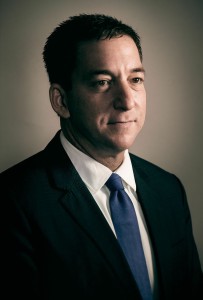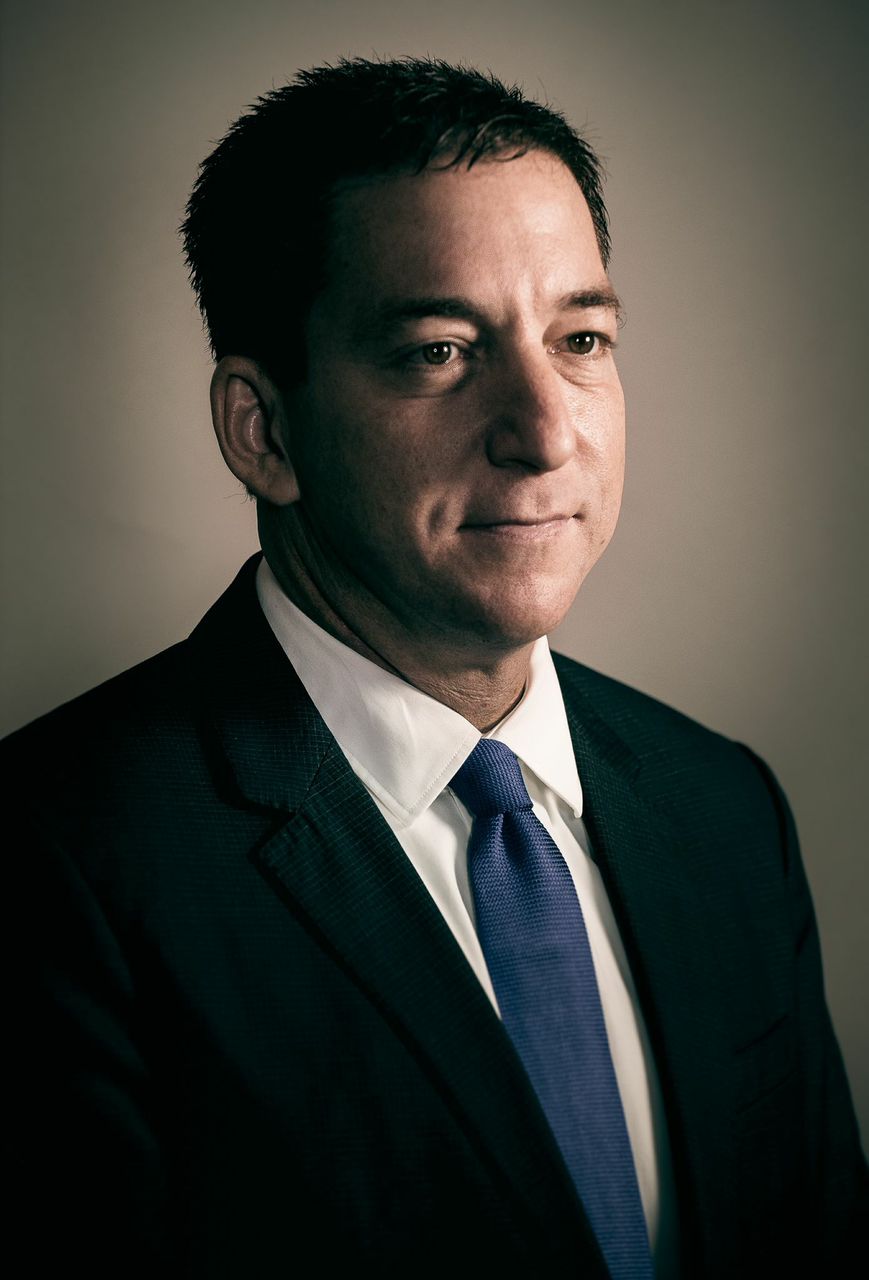Hundreds of students and community members attend Concordia Student Union-hosted talk Oct. 24
Canada was still mourning. Only two days earlier Michael Zehaf-Bibeau shot Canadian reservist Cpl. Nathan Cirillo while he stood on honour guard at the Tomb of the Unknown Soldier in Ottawa. Struck by grief, a dark nimbus enveloped Canadian skies. The shock of that day hung over us, we were all symbolically targeted and could each empathize with the fallen soldier. But that was not the theme for Greenwald’s talk at Concordia on October 24. Possibly all too experienced with grieving nations, Greenwald came to Concordia with a narrative that countered the excess of pained panegyrics.
“Obviously the events of this week have been pretty tragic and horrible to watch. But at the same time they actually provide what I could almost describe as the perfect framework for talking about the … way in which Western governments have been able to shape and manipulate their citizenries in the name of terrorism in order to dismantle the civil liberties and other legal protections that have long come to define how we think about ourselves in Western democracies,” Greenwald said as he began to address an auditorium humming with anticipation.
Hours before that first shot, the action that deluged our nation with outrage, Greenwald published a controversial article. He offered a reminder to those confused why Canada would be targeted by an ideologue, by a “radicalized muslim.”

“Canada has spent the last 13 years proclaiming itself a nation at war. It actively participated in the invasion and occupation of Afghanistan and was an enthusiastic partner in some of the most extremist War on Terror abuses perpetrated by the U.S. … Regardless of one’s views on the justifiability of Canada’s lengthy military actions, it’s not the slightest bit surprising or difficult to understand why people who identify with those on the other end of Canadian bombs and bullets would decide to attack the military responsible for that violence,” Greenwald wrote.
But in Parliament, in newspapers and across live broadcasts the ISIS was on display. It biased our thoughts and new tools to address the issue were propounded—increased surveillance and preventive detention are the anodyne prescribed by Justice Minister Peter MacKay and Prime Minister Stephen Harper.
Greenwald’s article hit a raw nerve. There was the expected twitter backlash and his inbox was filled with furious emails. It was no real surprise that Greenwald’s causal link between engaging in war and terrorist attacks was poorly received. Some critics called the move “too soon,” that it was inappropriate to comment on the tragedy while it was still fresh in our psyche. It was published the day of a shooting on parliament hill and though it wasn’t directly written about Wednesday’s events, the crux of the article may as well have been.
Canada had built a strong reputation as a participant in international diplomacy. We weren’t seen as an army of occupiers, we had a reputation as a friendly peacekeeping nation. Many Canadians still see ourselves through these rose-tinted glasses, but our nation has changed whether we realize it or not, and Greenwald argues there can be no “too soon” when talking about the ways we exert our wealth and power around the world. A crisis is a pivotal point for any nation’s long-term direction. In the hours and days after a critical event, when an entire nation’s attention has been joined and focused, very important decisions are made.
Before Greenwald spoke in Auditorium H-110, I asked him about Prime Minister Harper’s address on Wednesday night where he called on Canada to “redouble our efforts and those of our national security agencies to take all necessary steps to identify and counter threats and keep Canada safe here at home,” and to “strengthen our resolve and redouble our efforts to work with our allies around the world and fight against the terrorist organizations who brutalize those in other countries with the hope of bringing their savagery to our shores.”
Greenwald told me that, “it’s what Western governments have been doing for the last 12 years, which is immediately seizing on all of the emotions generated by these kinds of attacks, the surge of anger and fear and patriotism in order to justify whole new powers for themselves, and it’s just a pattern that goes without end. Here we are, 13 years after the 9/11 attack where governments around the West have continuously increased their own powers. And every time there’s one of these attacks, no matter how limited they are—and these are extremely limited in nature, the two that took place here—they immediately seize on it to try and justify powers that they wanted previously and whole new ones that they wanted.”
Just as Greenwald described it, that week in Parliament Justice Minister MacKay brought up the government’s intent to table new legislation that would enable preventative detention, or as he put it “pre-emptive measures,” to stop would-be terrorists. Preventative detention counters our entire judicial system. The belief of innocence-until-proven-guilty will never apply in this new world envisioned by our government. As Greenwald put it, “vesting the power with the government to imprison people without charges, which is what preventative detention is. Or to imprison people based not on crimes they’ve actually committed but acts the government anticipates or predicts they might engage in in the future is a complete dismantling of the core precepts of Western justice that have existed since thirteenth-century British subjects rebelled against the king and demanded the most basic protections of due process.”
Perhaps the most powerful moment of Greenwald’s speech came near its beginning. He spoke about the intense and detailed coverage of the two Canadian victims of last week. How the media delved into their histories and ambitions. We listened to their grieving relatives and were allowed to emotionally connect to these two men. Because of that, their loss affected us in a visceral way. But Greenwald made a bet with us. Despite Canada’s involvement in multiple wars across seven predominantly muslim nations, Greenwald “bet [us] that almost nobody in the auditorium can know the name of a single one of any of those many thousands of women and children and innocent men that our own governments have killed.”
He went on to say how, “they’re simply rendered invisible. We don’t hear their names, we don’t know about the lives that have been extinguished, we don’t hear from their grieving relatives. So what this does, is this creates a very imbalanced perception on the part of those of us who live in the countries where this kind of coverage takes place, which is that we are continuously the victims of violence that is horrific and that kills innocent people. And we forget, by design, that we perpetuate a huge amount of that violence as well.”
Greenwald encouraged the audience to take a piece of that emotion tied to the recent acts of violence in Canada and extend it to those who are made invisible. Mohammed Daoud Sharabuddin was also shot and he also died. Jeremy Scahill —a cofounder with Greenwald of their new media platform, The Intercept— chronicled the killing in his book, Dirty Wars.
Daoud died in his home in the village of Khataba, Afghanistan. His family had two dozen guests over to celebrate the naming of Daoud’s newborn son. It was a night raid that tragically mis-targeted a family of allies instead of Taliban insurgents. They weren’t shooting Daoud, they were shooting the enemy before they could shoot first. But it was Daoud, the police commander, who fell. Him and his fifteen-year-old son were shot by NATO snipers as they exited their home. The victims of that night totalled seven people, two of which were pregnant women. These people were allies. Daoud’s home was decorated with photos of him and american soldiers. He had gone through dozens of American training programs and was helping to combat the Taliban insurgency in the area. What happened after the soldiers discovered their night raid had unwittingly murdered their own allies is especially unsettling. On realizing the mistake they began to cut out their bullets from the women’s bodies in order to cover up their mistake. When the soldiers left, they took several of the still living guests with them for interrogation and held them for days. The story itself deserves much more detail than I can go into here; Daoud and his family members were subjected to inhuman terrors that night. Without Scahill’s detailed reporting of the incident it’s likely that the government narrative, the cover up, would have never been exposed. No one except those villagers still alive in Kataba would have known the real war in Afghanistan.
This is now the war that is unfolding in Iraq. There is no mythic battle between good and evil. When we arm our young men and women, fly them across the ocean into the unknown and put them into impossible situations, we are setting them and ourselves up for tragedy, for terror. The last decade has been one war waged across interchangeable battle fields.
As Canada prepares to send approximately 600 Canadian Armed Forces personnel to Iraq, Greenwald offers only so much comfort in the face of an uncertain future.




